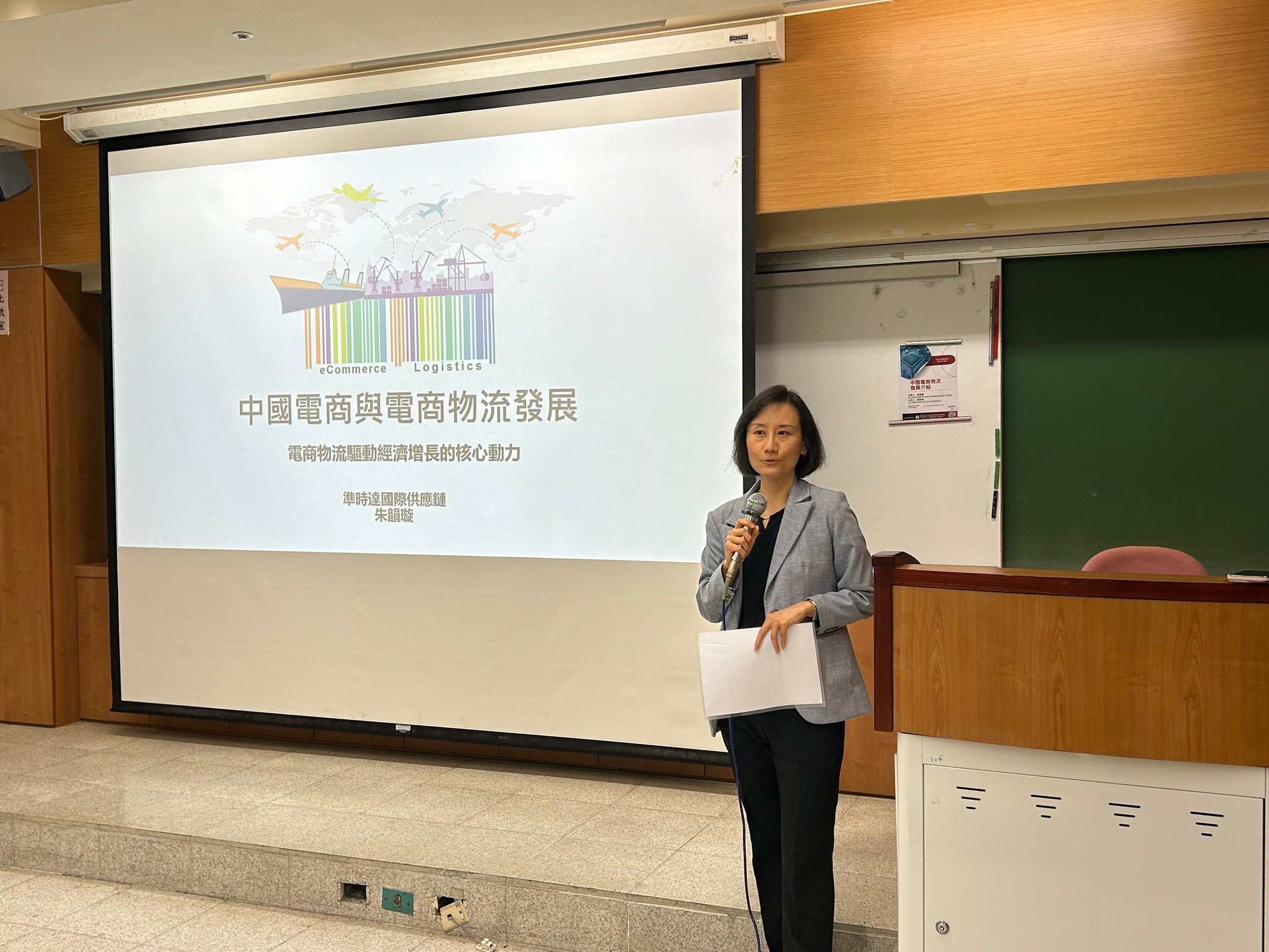Past Events
GIEAS Talk: Director Yun-Hsuan Chu (朱韻璇) of Foxconn Technology Group Discusses the Development of E-commerce and Logistics in China
On November 13, the Graduate Institute of East Asian Studies (GIEAS) hosted a special lecture featuring Yun-Hsuan Chu (朱韻璇), Director of Foxconn Technology Group's On-time International Supply Chain Project Management Office, who spoke on "The Development of E-commerce and E-commerce Logistics in China: Core Drivers of Economic Growth." The lecture, delivered in Mandarin, was chaired by GIEAS Director Chih-Shian Liou and attracted enthusiastic participation from students across various departments of the university.
The lecture was divided into four sections, where Director Chu thoroughly explored the current state and future trends of China's e-commerce and logistics industries. She began by introducing China's annual "Double 11" shopping event, using it as an entry point to discuss the rapid rise of e-commerce in the country and its profound impact on the logistics industry. Chu highlighted how the development of e-commerce is closely linked to advancements in logistics. She reviewed the four key stages of e-commerce growth in China: from its initial emergence in 1997, to the online payment breakthroughs achieved by platforms like Taobao, Alipay, and WeChat Pay in 2003, followed by the launch of the Double 11 promotion in 2009, which spurred the entire e-commerce industry. This, in turn, reinforced the critical role of logistics in e-commerce operations. Since 2015, e-commerce has entered a phase of transformation and differentiation, with intense market competition, the impact of the COVID-19 pandemic, and the rise of live-streaming culture further driving the diversification of e-commerce, fostering a mutually reinforcing "co-evolution" between e-commerce and logistics.
Next, Chu discussed the current state of e-commerce logistics in China. She pointed out that China's express delivery industry has gone through four development phases, with many courier companies experiencing multiple rounds of competition and consolidation. Key players in the market today include the "STO Express" group from Zhejiang, along with SF Express and others. Although SF Express currently holds the smallest market share among the six major express companies, it leads in revenue due to its focus on high-value goods transportation. Chu also analyzed how Chinese e-commerce platforms are increasingly prioritizing their own logistics systems, citing examples like Alibaba's Cainiao, JD.com's JD Logistics, and Pinduoduo's Jitu Express, all of which are committed to enhancing their in-house logistics operations to improve efficiency.
In the third section, Chu elaborated on the operational models of e-commerce logistics. She noted that while the profit margins in the logistics industry are typically low, the overall operation is highly complex, integrating B2C and traditional B2B logistics strategies. She introduced two main logistics models: JD Logistics' integrated warehousing and distribution system, and the point-to-point delivery model primarily used by network-based express services. She emphasized how JD Logistics has established warehouses in six major cities to shorten delivery times to consumers, while network express services rely on centralized warehouses for tiered distribution across the country.
Finally, Chu analyzed three of the most representative e-commerce logistics service providers: JD Logistics, Cainiao, and SF Express. JD Logistics, an independent company within the JD Group, not only handles orders for JD.com but also accepts external orders. JD Logistics focuses on a heavy-asset model, investing in warehouses to strengthen consumer-side smart supply chain management. In contrast, Cainiao Logistics, which handles all orders from Alibaba, operates with a platform-based technology model, collaborating with various suppliers and courier companies to enhance logistics efficiency without owning physical warehouses. SF Express, specializing in high-end goods and fresh produce, leads the industry with its cold-chain logistics technology. When it comes to asset investments, SF Express primarily invests in aircraft and airports, while JD Logistics focuses on warehouses, resulting in different models for fast product delivery. At the conclusion of her lecture, Chu shared her views on future logistics industry trends, predicting a stronger emphasis on smart packaging, green packaging, autonomous truck deliveries, and supply chain control towers.
This lecture was the second in GIEAS's "China Economic Special Topics" series. Director Yun-Hsuan Chu not only shared the operational models of On-time and key Chinese e-commerce and logistics companies but also integrated personal experiences to provide insights into daily consumer practices in China, offering attendees a deeper understanding of the development of e-commerce and logistics in the country. During the subsequent Q&A session, several students raised questions about Foxconn's logistics needs, Chinese government subsidies, and drone deliveries, and Chu engaged in lively, in-depth discussions with the attendees. Director Liou announced that similar topic-focused lectures would be held in the future and encouraged students and faculty to stay informed about upcoming events and lectures organized by the Graduate Institute of East Asian Studies.





.jpg)

